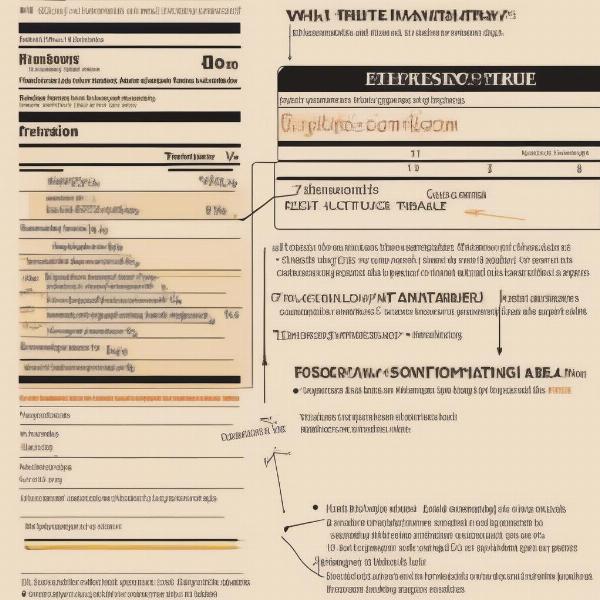Choosing the right dog food is crucial for your dog’s health and well-being. Protein, a vital nutrient, plays a key role in muscle development, tissue repair, and overall bodily functions. Understanding your dog’s protein needs and selecting a dog food that meets those needs is essential for maintaining their optimal health and vitality. This guide will delve into the importance of protein in dog food, helping you navigate the various options available and make informed decisions for your furry friend.
Choosing a dog food based on its protein content can feel overwhelming with so many options available. This article will break down everything you need to know about dog food for protein, from understanding your dog’s individual needs to selecting the best food for their age, activity level, and overall health. We’ll explore different protein sources, discuss the benefits of high-protein diets for specific dogs, and help you decipher dog food labels. Let’s empower you to make the best dietary choices for your canine companion!
Understanding Your Dog’s Protein Needs
How much protein does a dog actually need? This depends on various factors, including age, activity level, and overall health. Puppies, for instance, require more protein for growth and development than adult dogs. Similarly, highly active dogs, such as working breeds or sporting dogs, need more protein to support their energy levels and muscle recovery.
What are the signs of protein deficiency in dogs? A dog lacking sufficient protein may exhibit symptoms like weight loss, muscle wasting, a dull coat, and decreased energy levels. If you notice any of these signs, consult your veterinarian.
Decoding Dog Food Labels: Focus on Protein
Understanding dog food labels is essential when choosing a protein-rich diet for your dog. The guaranteed analysis section provides the minimum percentages of crude protein, fat, fiber, and moisture in the food. Look for dog foods with a higher percentage of crude protein if you’re aiming for a high-protein diet. However, remember that quality matters as much as quantity.
Don’t just focus on the protein percentage; consider the source as well. High-quality protein sources, such as chicken, beef, lamb, fish, and eggs, are more digestible and provide a better amino acid profile for your dog. Look for these ingredients listed prominently on the label. Avoid foods with vague protein sources like “meat by-products” or “animal digest.”
 Analyzing a Dog Food Label
Analyzing a Dog Food Label
High-Protein Dog Food: Benefits and Considerations
High-protein dog food can be beneficial for certain dogs, particularly those with higher energy demands. It can help maintain lean muscle mass, support a healthy coat, and provide sustained energy. high protein dog food for puppies is especially important for their growth and development. However, it’s important to consult with your veterinarian before switching your dog to a high-protein diet, especially if they have any underlying health conditions.
Too much protein can be harmful to dogs with kidney or liver disease. low protein low phosphorus dog food is often recommended for dogs with these conditions. Also, individual dogs may react differently to various protein sources. If you notice any digestive issues or allergies after switching to a high-protein food, consult your vet.
Exploring Different Protein Sources: From Chicken to Kangaroo
Various protein sources offer different benefits and can cater to dogs with specific dietary needs. Chicken and beef are common and generally well-tolerated sources. Fish, like salmon, is rich in omega-3 fatty acids, which are beneficial for skin and coat health. Novel protein sources like kangaroo for dogs food are a great option for dogs with allergies to common proteins. high protein dog food often utilizes a variety of these sources.
Consider rotating protein sources periodically to provide a wider range of nutrients and prevent your dog from developing sensitivities to a specific protein. Always transition gradually to a new food to avoid digestive upset.
Conclusion
Choosing the right dog food for protein is a crucial aspect of responsible pet ownership. By understanding your dog’s individual needs, decoding dog food labels, and considering different protein sources, you can empower yourself to make informed decisions that support your furry friend’s optimal health and well-being. Always consult your veterinarian for personalized advice tailored to your dog’s specific needs and health status.
FAQ
- How much protein does my dog need? The protein requirements vary depending on age, activity level, and overall health. Consult your veterinarian for personalized recommendations.
- What are signs of protein deficiency in dogs? Weight loss, muscle wasting, a dull coat, and decreased energy can be indicators of protein deficiency.
- Is high-protein dog food good for all dogs? No, high-protein diets are not suitable for all dogs, particularly those with kidney or liver disease. Consult your vet before switching.
- What are some good protein sources for dogs? Chicken, beef, lamb, fish, eggs, and novel proteins like kangaroo are all good options.
- How can I tell if my dog is allergic to a certain protein? Look for signs like skin irritation, digestive upset, or ear infections. Consult your vet for diagnosis and dietary recommendations.
- Should I rotate my dog’s protein sources? Rotating protein sources can provide a wider range of nutrients and prevent sensitivities. Transition gradually to new foods.
- Where can I find more information about low protein dog food uk? You can find specific recommendations on our website for options available in the UK.
ILM Dog is a leading international online resource dedicated to providing expert advice on dog care and nutrition. We offer a comprehensive range of information on dog breeds, health, training, nutrition, grooming, and much more. From puppy care to senior dog needs, we cover all aspects of responsible dog ownership. For expert advice tailored to your furry friend, contact us at [email protected] or call us at +44 20-3965-8624. ILM Dog is your trusted companion in your dog’s journey to a healthy and happy life.